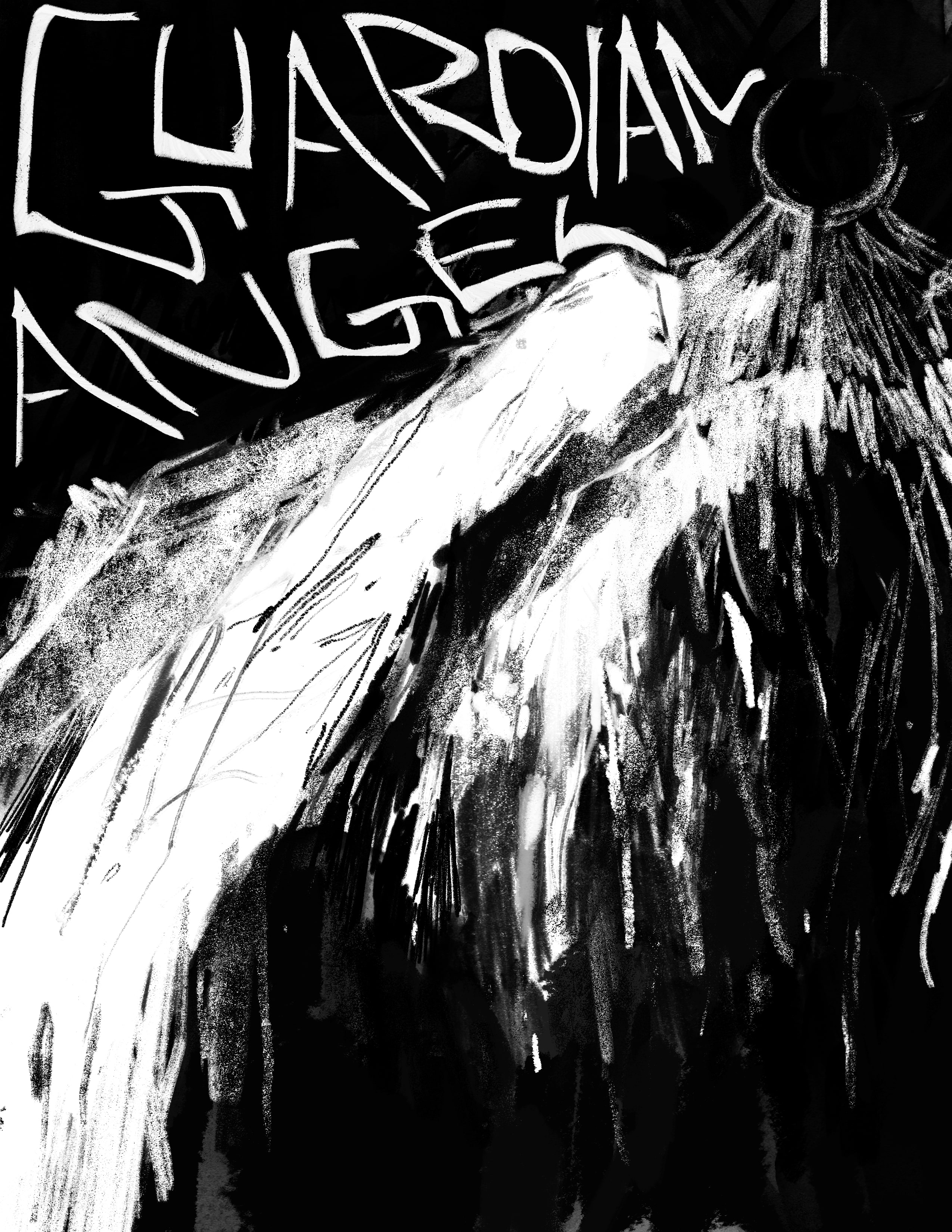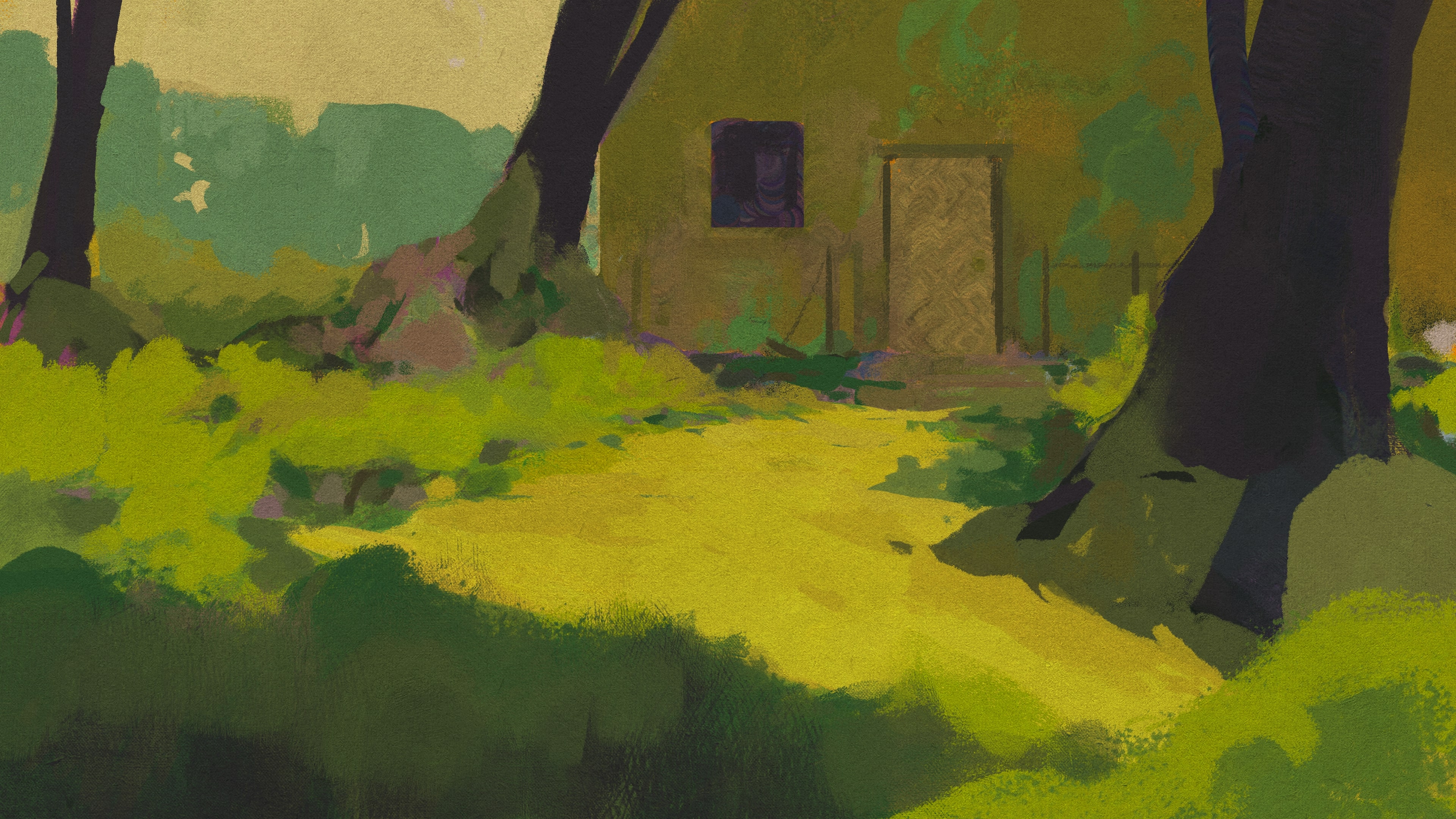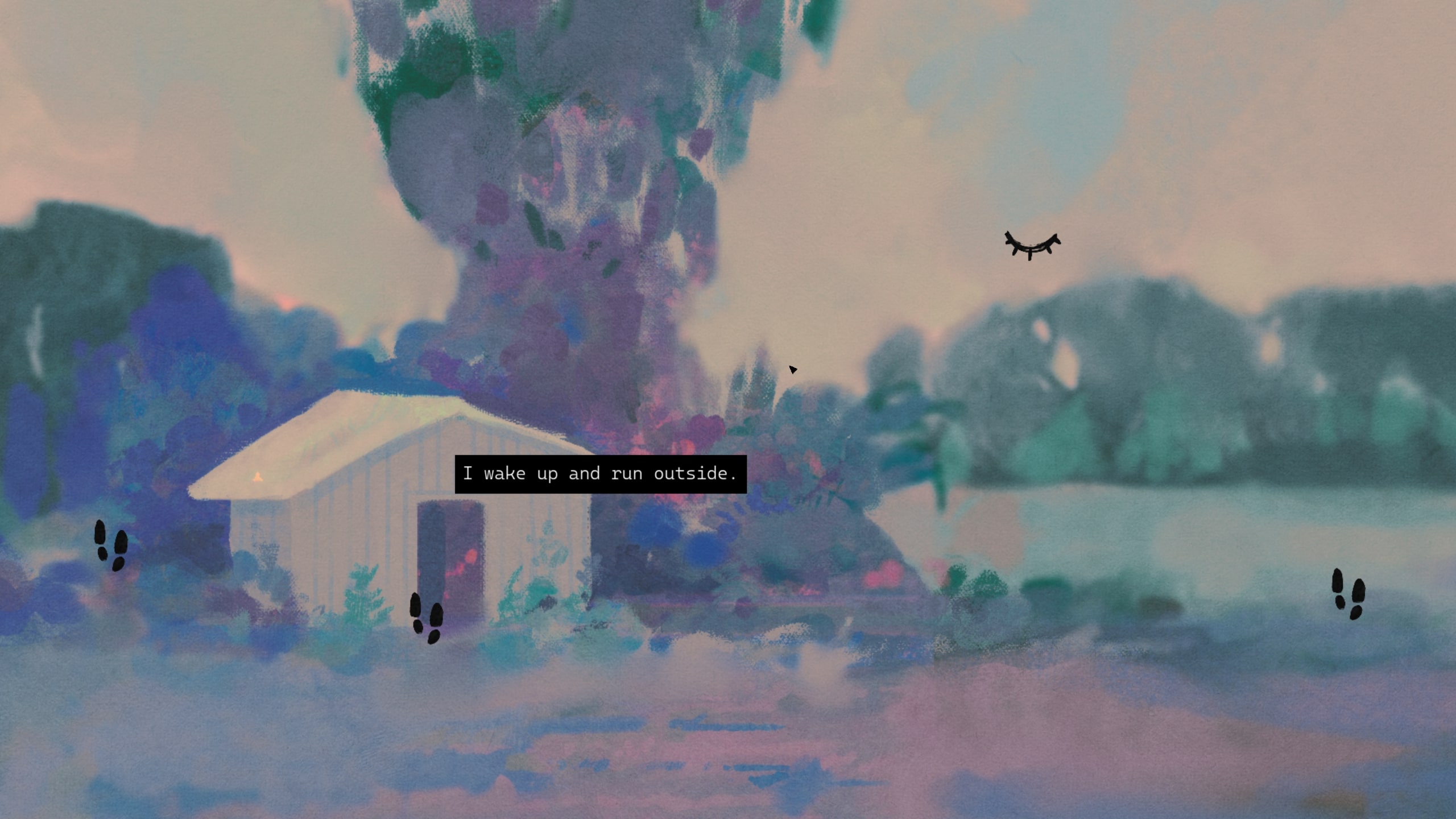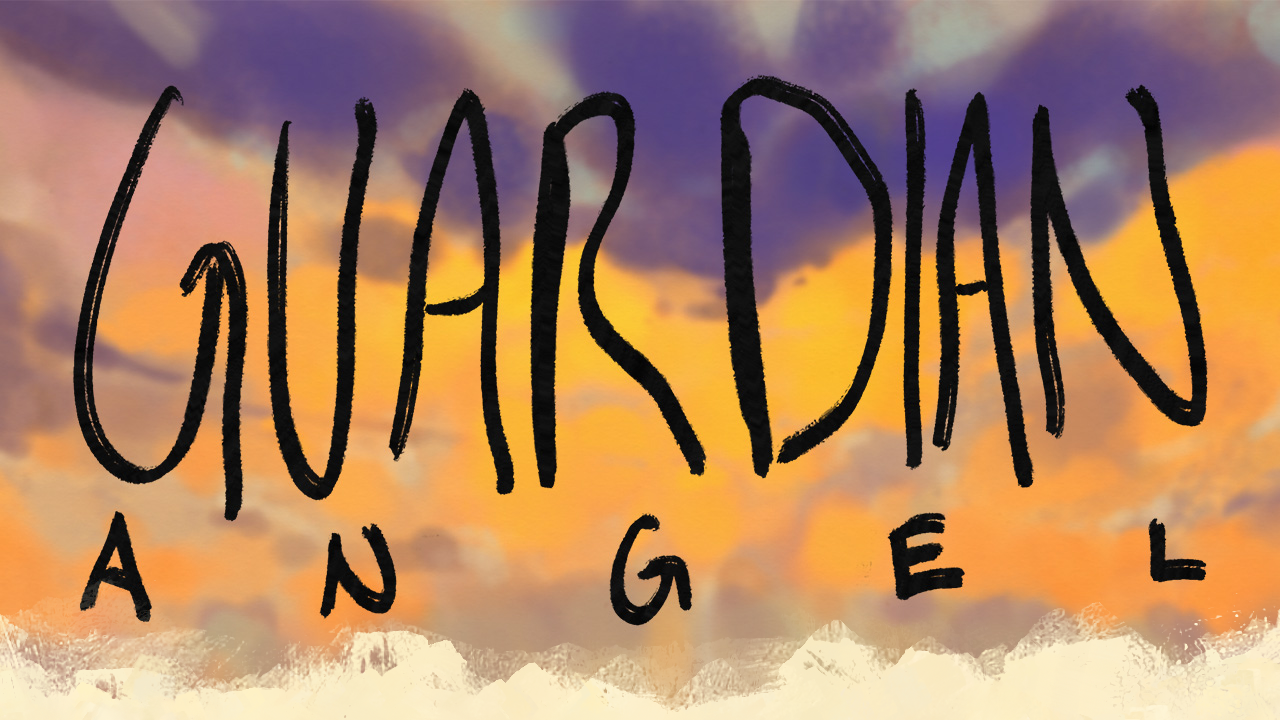GUARDIAN ANGEL POSTMORTEM
Hi all! It's been a while since I released GUARDIAN ANGEL, so I figured now would be a good time to reflect on making the game and some of the things I learned in the process. Hopefully this article will be insightful to anyone who enjoyed reading GUARDIAN ANGEL or to anyone considering making their own interactive fiction game. I hope you enjoy!
Note that this postmortem will talk spoil most of the content in GUARDIAN ANGEL, so I'd recommend playing the game first and coming back after that (it should only take ~15 minutes.)
Why GUARDIAN ANGEL?
After finishing SALTWATER I had initially planned to start a visual novel similar in length and scope to SALTWATER. Unfortunately, writing/illustration/programming a game at this scale is difficult! I still think fondly of what I have of the script for this visual novel, but I knew I'd have to shelf this idea for now and work on another project instead.
Thus, I started work writing several small stories. I was initially planning to release these stories in a bundle/collection on Christmas of last year, just about 2 months after the release of SALTWATER. GUARDIAN ANGEL was the title of my favorite of these stories and was going to be the title of the collection as well. I even sketched a cover, see the below image:

Eventually as I started thinking more and more about GUARDIAN ANGEL, the less the format of a short story seemed to make sense to me. The order of the events and recollections in the story didn't particularly matter and it seemed like a more interactive medium would be the better fit. So I started work on GUARDIAN ANGEL, the game, with the goal of a Christmas 2023 release date (I did not make this goal.)
Narrative Design Things
Unlike my first game, SALTWATER, GUARDIAN ANGEL initially started out as a completely linear short story about a narrator going through their day as they continue work on their project to create their own guardian angel after the disappearance of their mother. The tone of the story bordered on apocalyptic; the narrator was the only person left in this world. But as the story continued, it became clear that this wasn't actually the case. The isolation of the narrator was self-imposed, a trait passed onto them from their mother.
A point-and-click game was a good format for this story for a few reasons. First, this format allows players to explore the world with more intimacy than I could achieve with just words. Many scenes and recollections the narrator had in the short story version of GUARDIAN ANGEL were motivated by the narrator's whims and they noticed aspects of their surroundings. I think that a player clicking on the sky and reading the narrator's thoughts about the sky connects the player to the narrator more than if the narrator were to say something about the sky unprompted.
The narrator of GUARDIAN ANGEL is set on something resembling a quest that involves picking up different items and moving between different places. This ended up becoming the means of progression of GUARDIAN ANGEL, even if it's never explicitly stated what the player's goal is. Because of this ambiguity, I used some admittedly "video game-y" dialogue from the narrator to signal that a player should go check something else, then maybe come back later:
I've run out of material, I need to go back to the community center.
I still have those old tapes somewhere at home, but it's been a long time since I've watched any of them.
I'll bring it here when I'm done.
In retrospect, I think it may have worked better to try to convey this information using art. More specifically, every interactable object in GUARDIAN ANGEL is represented either by a "footprint" icon or a "eye" icon. Interacting with the former moves the player between different rooms, while the latter includes every other kind of interaction. Some of these interactions are passing thoughts, while others affect the flower of the game. In retrospect, the different interactions represented by the same "eye" icon could have used two different icons for clarity.
Technical Things
GUARDIAN ANGEL was made in GameMaker in a custom system that relied pretty heavily on Chatterbox, an implementation of the Yarn narrative scripting language. The backgrounds in GUARDIAN ANGEL make use of a parallax effect that allows the player to tilt how the camera is oriented with the scene. This was not an easy effect to pull off in GameMaker, but I think it added a nice bit of polish to the final game. Text rendering was done using Scribble, which was how I achieved the typing effect.
This was my first time working in GameMaker (and really, my first time working in a game engine that looked anything like this) and the result was a lot of code that ended up messier than I'd like to admit. If any artists or writers are reading this and are curious about creating a piece of interactive fiction, I'd highly recommend starting out by playing around with template projects (they don't even have to be in the engine of your choice!) or small game engines with a very narrow use case before diving into creating something yourself. I think this will help you get a better idea of what kinds of tools you like to work with and how you might go about implementing them into your own game.
Art and Design Things
My goal with the design of GUARDIAN ANGEL was to create something that felt tactile, even if the medium itself was very digital. For the illustrations, I mostly worked in my comfort zone of landscapes, making pretty heavy use of different effects to give the paintings a feeling of age. You can watch me painting some of these scenes here and here. Lots of the paintings here made use of noise and paper textures to give them a more tactile feeling.

Stylistically, I think these elements came to head after the narrator goes to sleep. The following painting combined flagrantly digital colors and effects with some of the most obvious use of paper textures in the whole game.
I took a lot of visual inspiration for what I wanted the dialogue system to look like from Kentucky Route Zero. The font choice along with the typewriter noises as the text scrolls were meant to evoke something distinctly tactile. Most of the audio design involved using freely available ambient noises that felt warm and lush. Interior spaces were purposefully much quieter than outdoors spaces. Different areas having different associated ambient noises helped give the world a feeling of space, even when clicking around to explore every area would only take a few seconds. The cumulative effect of all of these choices was something that I thought ended up feeling tactile and really distinct from my first game, SALTWATER, where everything felt a great deal darker and colder.

If you'd like access to wallpaper quality versions of all of the assets used in GUARDIAN ANGEL, they're up for free on the itch page, I hope you enjoy them!
Release and Marketing
For the release of GUARDIAN ANGEL, I produced a short trailer, which you can view here. Initially, I released GUARDIAN ANGEL as a Windows only game with no associated browser version. In retrospect, I think this was a regrettable move as GUARDIAN ANGEL is a short enough experience that I think it would actually work best in the browser.
A little over a month after release I came to the conclusion that I should adapt the game for web browsers. This ended up being its own can of technical and design worms. On the design side, the resolution for different assets (as well as the text) was necessarily lower than the resolution for those same assets in the downloadable version. To account for this, I upscaled the font along with a lot of the text-boxes in the game to ensure that they were legible, even if a player had not entered full screen mode. For accessibility purposes, I think it would have been even better to include this as an option in both versions of the game, but the code would require a fair amount of refactoring for this to be possible.
At release, I struggled to define exactly what the point of GUARDIAN ANGEL was. Despite my previous game, SALTWATER, being much more involved with roughly a dozen characters and multiple plot-lines, I still found that game to be easier to summarize: it's about the end of the world. This, along with some context-less lines about the story, made for a relatively interesting hook that didn't give anything away:
An old woman seeks salvation for her granddaughter as the world ends around her.
A cult of children worshiping the carcasses of dead pigs prepare to carry out their final task.
Someone comes back home after a decade of promising themselves that they never would.
I didn't have anything like this for GUARDIAN ANGEL on release, which was fumbling the attention of anyone who landed on the page! I've since updated the story page with a more interesting tagline:
I wake up and run outside. The air is still and I know that today can't be the day.
It's been years since she left you. You know she would be upset if she saw what you're doing now, but who else could ever watch over you like her? GUARDIAN ANGEL is a short point-and-click narrative game about finding your way through the world on your own.

Reception and Reflection
Overall, everyone who I heard from that played GUARDIAN ANGEL seemed to enjoy it. I received especially positive comments about the atmosphere and artwork. More people played my previous game, SALTWATER, which makes sense as I spent a much longer period promoting that game and got it featured in Indiepocalypse Issue #49.
I think a lot about the piece of gamedev advice that goes something like: "You should never start by making your dream game, you should make something much smaller instead." I'm not sure how well this advice applies to the visual novel/interactive fiction space where creating something with a sense of scale requires less resources than, say, an MMORPG. I think it's possible in interactive fiction to follow through on comparatively big conceptual swings without ballooning development time to an unreasonable place for a hobbyist. That being said, there are a lot of skills that I think can only be trained by making a complete and finished thing and sharing it with the world. I'm happy I took some time after releasing SALTWATER to make something shorter, both because I think it turned out well on its own, but I also feel more prepared to work on my next game now.
What now?
At the time of writing, I'm hard at work on REPEAT IT BACK TO ME, a romance/horror visual novel set to (hopefully) release later this year. Go check it out! I think this one has some of my favorite writing and illustrations I've done, so keep your eyes on for release.
I still have a collection of short stories written near the end of 2023/start of 2024 that I'd like to release in some capacity, probably as small web games? Who knows!
Thank you for reading,
- Sky
Get GUARDIAN ANGEL
GUARDIAN ANGEL
Point-and-click narrative game about being left alone in the world.
| Status | Released |
| Author | SkyShard |
| Genre | Interactive Fiction, Simulation, Visual Novel |
| Tags | 2D, artgame, Atmospheric, Hand-drawn, Narrative, Point & Click, Short, Story Rich |
| Languages | English |
More posts
- GUARDIAN ANGEL Web Version Out Now!Mar 14, 2024
- GUARDIAN ANGEL Wallpaper pack out now!Feb 11, 2024
- GUARDIAN ANGEL OUT NOW!Jan 27, 2024

Leave a comment
Log in with itch.io to leave a comment.